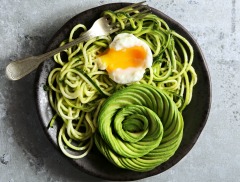Don't just meal plan... meal plan intelligently - with Meal Genius! Sign up for our free newsletter to get delicious recipes, sample meal plans and a whole lot more!
Greens, Collards
Collards are a member of the Cruciferous family of vegetables and are believed to be among the oldest members of the cabbage family to be cultivated.
Long popular as a "Southern" food (and one of the most healthy!), collards are easy to prepare and accompany almost any dish - ranging from seafood to steak.
A good source of vitamin C, beta-carotene and folate, these greens also provide cancer-fighting phytonutrients including glucosinolates and indoles.
The Benefits
- Special diets: Autoimmune Paleo Diet, Candida Diet, Diabetic, Elimination Diet, Gluten-Free Diet, Gluten-Free/Dairy-Free Diet, Grain-Free Diet, Low Acid Diet, Low Carb Diet, Low FODMAP Diet, Low Histamine Diet, Low Oxalate Diet, Low Starch Diet, Paleo Diet (Light), Paleo Diet (Strict), PCOS Diet, Pescetarian Diet, Primal Diet, Thyroid Diet, Vegetarian Diet, Whole Food
- Excellent Source of: VitaminA, VitaminC, VitaminK
- Good Source of: Folate
- Preferences: No Fish, No Red Meat, No Pork, No Eggs, No Shellfish, No Gluten, No Nuts, No Seeds, No Soy, No Dairy, No Poultry, No Molds, No Citrus, No Pseudograins, No Coconut, No Nightshade, No Legumes, No Grains, No Corn, No Yeast, No Peanuts, Low Carbohydrate, Low Cholesterol, Low Fat, Low Sodium, Low Sugars, Low Saturated Fat
Related Foods
Related Nutrients
Selecting and Storing
Choose smaller-leaved plants for tenderness and mild flavor and look for a leaves that are green, moist, crisp, and unblemished. Wrap unwashed collard greens in damp paper towels, place in a plastic bag and store them in the refrigerator crisper for three to five days.









